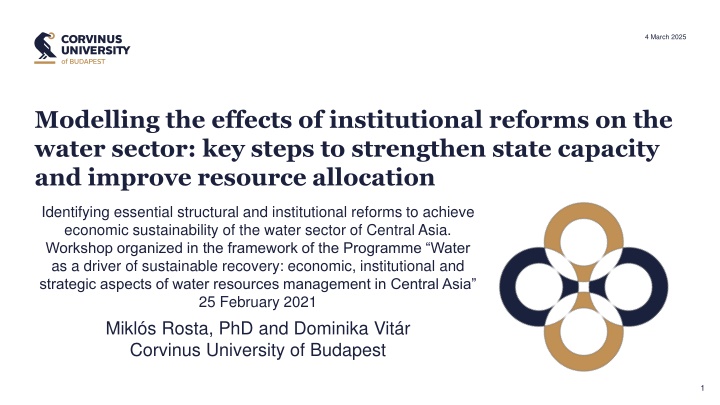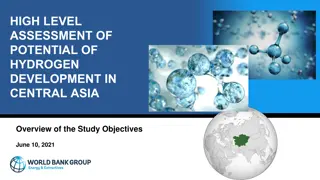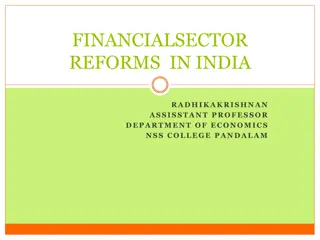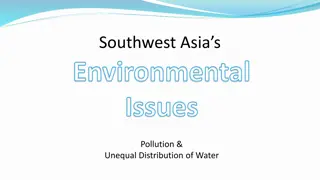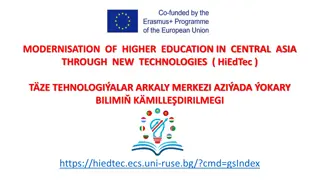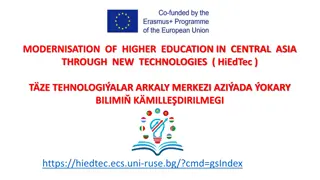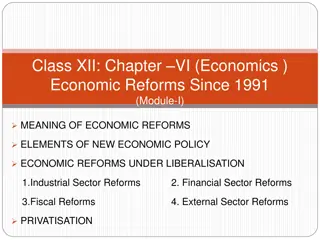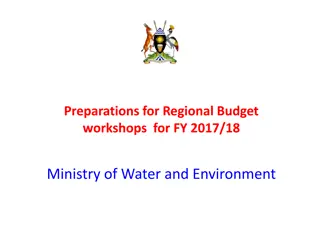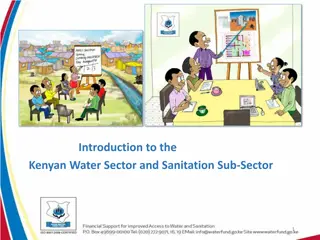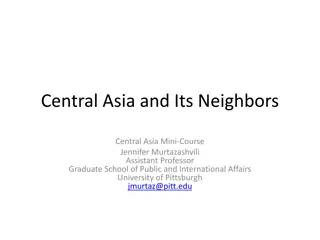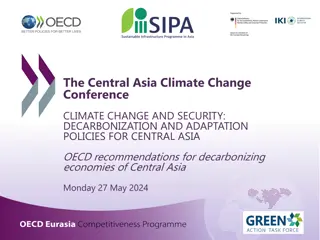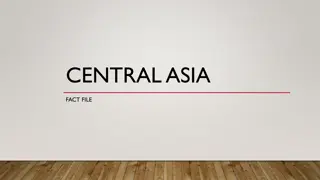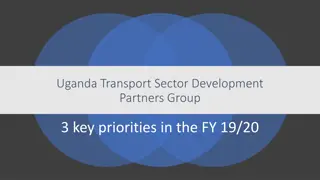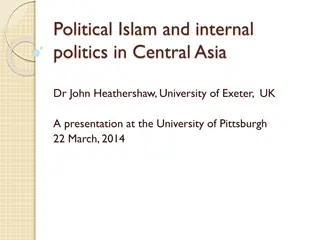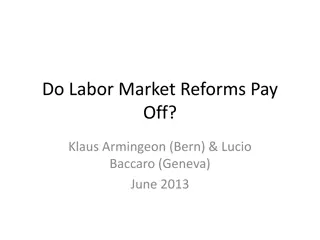Enhancing Water Sector in Central Asia through Institutional Reforms
This research focuses on institutional reforms in the water sector of Central Asia to improve resource allocation and state capacity. Key steps include investing in human development, strengthening state capacities, and fostering cooperation among Central Asian countries and non-state actors. The study utilizes Structural Equation Modelling (SEM) to analyze causal relationships and identifies factors essential for economic sustainability in the region.
Download Presentation

Please find below an Image/Link to download the presentation.
The content on the website is provided AS IS for your information and personal use only. It may not be sold, licensed, or shared on other websites without obtaining consent from the author.If you encounter any issues during the download, it is possible that the publisher has removed the file from their server.
You are allowed to download the files provided on this website for personal or commercial use, subject to the condition that they are used lawfully. All files are the property of their respective owners.
The content on the website is provided AS IS for your information and personal use only. It may not be sold, licensed, or shared on other websites without obtaining consent from the author.
E N D
Presentation Transcript
4 March 2025 Modelling the effects of institutional reforms on the water sector: key steps to strengthen state capacity and improve resource allocation Identifying essential structural and institutional reforms to achieve economic sustainability of the water sector of Central Asia. Workshop organized in the framework of the Programme Water as a driver of sustainable recovery: economic, institutional and strategic aspects of water resources management in Central Asia 25 February 2021 Mikl s Rosta, PhD and Dominika Vit r Corvinus University of Budapest 1
4 March 2025 Institutional reforms on the water sector in Central Asia Content Research questions and hypotheses Preliminary model on main causality Methodology Proxy-variables Invitation to join our research group from Central Asia 2
4 March 2025 Institutional reforms on the water sector in Central Asia Research question and hypotheses What are the main drivers which enhance the water resource management capacities of the Central Asian countries? The most important success factor for enhancing management capacities in the water sector is investment in human development in general and in specific areas (STEM - science, technology, engineering, and mathematics). Good institutions in the water industries (private property rights, efficient market coordination, price liberalization) are also critical success factors, but alone they are not sufficient to increase the efficiency and effectiveness of the water sector in Central Asia. State capacities have direct effect on water management capacities. Strengthening state capacities (effective tax collection, effective public administration, effective state ownership, effective public service delivery). Cooperation between Central Asian countries and cooperation with non-state actors (businesses and NGOs) are also boost management capacities in the water sector. 3
4 March 2025 Institutional reforms on the water sector in Central Asia Preliminary model on main causality International cooperation Cooperation between countries of Central Asia Good institutions State capacity Water management capacities Human Development Cooperation with other sectors of the society Coproduction, collaborative governance, Public-Private-Partnership Control variables GDP / capita PPP Inflation, FDI / capita, Initial condition index, level of socio- economic development 4
4 March 2025 Institutional reforms on the water sector in Central Asia Methodology: SEM Panel Analysis by means of Structural Equation Modelling (SEM) About SEM: Analysing multivariate causal, relationships. Test the direct and indirect effects on pre-assumed causal relationships. Two statistical methods: confirmatory factor analysis and path analysis. (Y. Fan, J. Chen, G. Shirkey, R. John, S. R. Wu, H. Park and C. Shao, 2016.) 5
4 March 2025 Independent variables Header State capacity: Steering capability (priorization, implementation, policy learning) from BTI Stateness (Monopoly on the use of force, state identity, no interference of religious dogmas, basic administration) from BTI Currency and price stability (anti-inflation / forex policy, macrostability) from BTI Shadow economy index from Leandro, Medina and Friedrich Schneider (2018) Political Stability and Absence of Violence/Terrorism from WDI (Worldbank) Human development: Educational Index from HDI (UNDP) Expected years of schooling (years) from HDI (UNDP) Gross enrolment ratio, tertiary (% of tertiary school-age population) from HDI (UNDP) Institutional factors: Organization of the market and competition (Market-based competition, anti-monopoly policy, liberalization of foreign trade, banking system) from BTI Rule of law (Separation of powers, Independent judiciary, Prosecution of office abuse, Civil rights) from BTI Private property (Property rights, Private enterprise) from BTI International cooperation: International cooperation (effective use of support, credibility, regional cooperation) from BTI Number of embassies around the globe ? Meeting of presidents and highlevel politicians in the region - ? Cooperation with other sectors of the society, especially civil sector Core civil society index from V-Dem Civil society participation index from V-Dem 6
4 March 2025 Header Dependent variables Water management capacity: Proportion of population using piped drinking water sources from UNICEF Proportion of population using sanitation facilities connected to sewer networks and with sewage treated to at least secondary levels from UNICEF 7
4 March 2025 We are inviting you to join our research team! To train a new generation of analysts who can advise governments on institutional reforms in support of the water sector. Modelling the effects of institutional reforms on the water sector would improve the allocation of scarce resources and allow for optimal sequencing of reform steps. CUB can offer research grants to teams of researchers or students. Active involvement of students would strengthen research/education interface. 8
Thank you for your attention! Mikl s Rosta, PhD: miklos.rosta@uni-corvinus.hu Dominika Vit r: dominika.vitar@stud.uni-corvinus.hu
